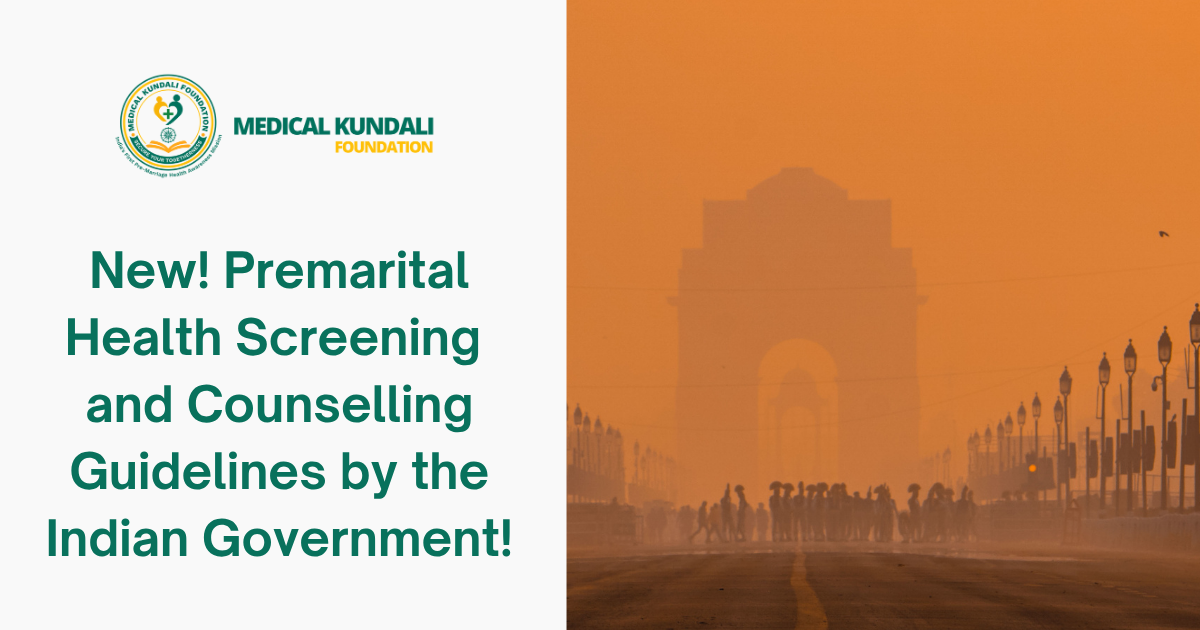New Premarital Health Screening Guidelines Recommended by Global and Indian Authorities + Why It Matters for You?
One of the first questions Indian families ask when we mention pre-marital testing is:
“Aisa toh koi kanoon nahi hai. Sarkar toh nahi bolti yeh sab karne ke liye.”
Here’s the truth:
✅ Though, it isn’t legally mandatory yet but top global and Indian health organisations strongly recommend pre-marital testing. And some states in India have started framing rules soon for specific tests like thalassemia compulsory for couples before marriage.
This blog breaks it down — with facts, official documents, and expert consensus.
ICMR (Indian Council of Medical Research)
ICMR is India’s top medical research body under the Ministry of Health & Family Welfare.
ICMR’s Stand on Premarital Health Screening:
- Recommends Thalassemia screening before marriage, especially in high-risk communities.
- Supports carrier detection and genetic counselling in colleges and schools.
- Encourages public awareness through NGOs like Medical Kundali Foundation and camps.
- Advocates the use of Hb Electrophoresis as a simple tool to detect carriers.
ICMR: “Carrier screening is a cost-effective and preventive strategy.”
✅ Source: ICMR’s National Guidelines for Hemoglobinopathies in India
MOHFW (Ministry of Health and Family Welfare – Govt. of India)
The Ministry of Health has:
- Approved “Thalassemia Prevention and Control Programme”.
- Issued advisories to state health departments to conduct school & college-level screening.
- Partnered with NGOs like Medical Kundali Foundation to run awareness drives in tribal and urban areas.
- Started integrating genetic counselling in public hospitals.
While not legally enforced yet, the policy direction is clear: Promote pre-marital genetic awareness.
WHO (World Health Organization)
WHO’s Key Recommendations:
- Encourage voluntary pre-marital screening in populations with high carrier rates.
- Raise awareness about inherited disorders like Thalassemia, Sickle Cell, Syphilis, etc.
- Provide non-directive counselling for couples at risk.
- Promote informed reproductive choices to reduce the burden of genetic diseases.
WHO supports screening before consanguineous marriages (common in India and Middle East)
WHO: “In regions with high carrier frequency, population-wide genetic screening should be considered.”
Indian States That Took Action
1) Gujarat
Thalassemia testing is encouraged before marriage with major campaigns led by the Indian Red Cross Society (Gujarat branch) promoting voluntary testing and awareness, especially among college students and young adults.
2) Odisha
Odisha Government provides free Hb electrophoresis tests as part of their intensified drive against sickle cell disease and thalassemia. Screening is being conducted widely through platforms like schools, anganwadi centres, antenatal care camps, mobile health units in tribal areas, and urban health centres including Ayushman Arogya Mandirs. Children in the age group 0-18 years, including students, are being screened free of cost in these programs.
3) Maharashtra
- Supported by private-public partnerships and CSR for tribal genetic awareness.
- Expanding programs under the State Blood Cell.
India’s Policy Direction Is Moving Toward Preventive Marriage Health
- Ayushman Bharat could include Genetic Disorders under NCD screening in coming future.
- CSR Schedule VII includes healthcare, women’s welfare, and awareness.
- National Health Mission backs community health mobilisation.
The momentum is building. Foundations like Medical Kundali are accelerating the push.
Why Pre-Marital Health Screening Should Matter to You?
Because Pre-Marital Health Screening plays a crucial role in ensuring healthier marriages and families while preventing the transmission of hereditary and infectious diseases.
Importance for Modern Generations:
Modern couples often marry later in life and may have increased awareness of genetic risks. Pre-marital screening helps them:
-
Identify genetic carrier status for diseases like thalassemia or sickle cell anemia, reducing the risk of affected offspring.
-
Detect chronic or infectious diseases (e.g., HIV, hepatitis) early, enabling timely treatment and informed decisions.
-
Plan for healthier pregnancies with proper medical guidance.
-
Reduce healthcare burdens by preventing hereditary diseases.
Importance for Older Generations:
For older generations who often follow traditional practices, pre-marital screening:
-
Provides scientific validation and reassurance regarding hereditary risks that were previously unknown.
-
Helps reduce social stigma by promoting health awareness and open discussions.
-
Protects future generations from genetic disorders historically prevalent in communities.
-
Ensures longer, healthier family lines through preventive healthcare.
Shared Benefits
-
Promotes informed family planning across generations.
-
Lowers public health costs by lessening the incidence of genetic and chronic diseases.
-
Fosters healthier, sustainable communities through preventive care.
Thus, pre-marital health screening bridges traditional values and modern medical science, benefiting both generations by safeguarding individual and family health comprehensively.
- You’re not just getting tested — you’re aligning with national and global health missions.
- Medical Kundali isn’t a random idea — it’s ICMR and WHO approved in principle.
- When you act early, you’re preventing future burden on India’s already stretched health system.
Medical Kundali Foundation’s Work Supports These Goals
- Awareness campaigns on ICMR-backed diseases.
- Thalassemia & Sickle Cell detection camps.
- Policy advocacy for making screening a standard pre-marital norm.
- Collaboration with MOHFW & state-level programs.
Final Thought: Science and Policy Are on Your Side
When WHO, ICMR, and MOHFW already recommend it — it’s your cue to be proactive.
Let’s not just follow laws. Let’s follow logic, care, and foresight. Let’s do premarital health screening before marriage,
